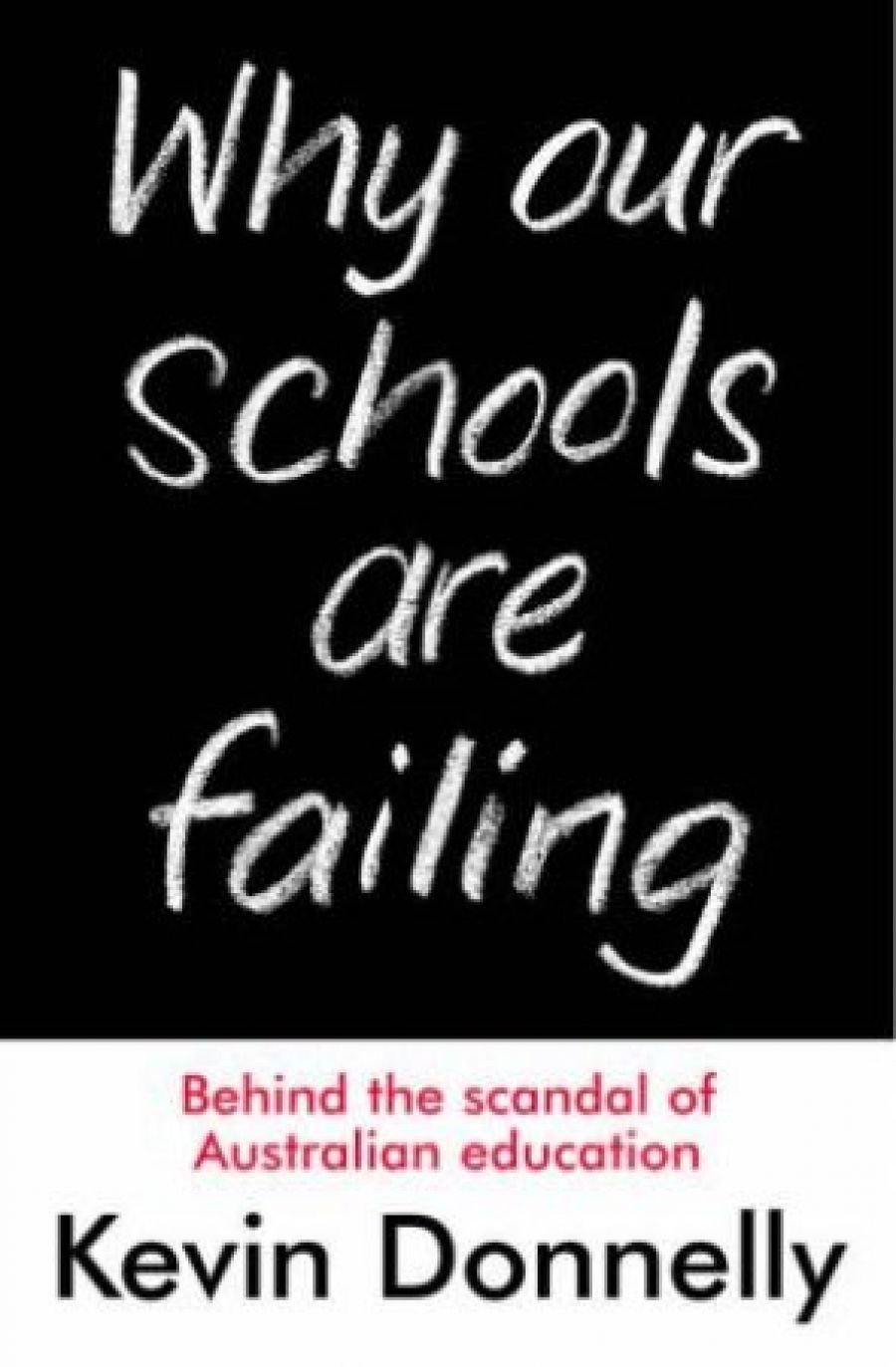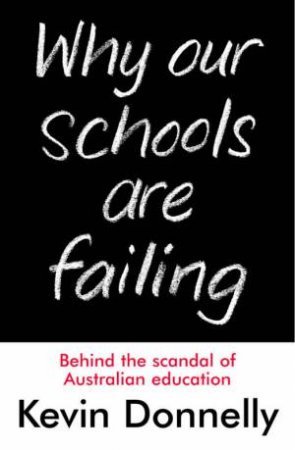
- Free Article: No
- Contents Category: Education
- Review Article: Yes
- Article Title: Dubious Appeal
- Online Only: No
- Custom Highlight Text:
Commissioned by the Liberal Party thinktank, the Menzies Research Centre, this book has as its subject the ‘crisis’ in education. It opens with an endorsement by Malcolm Turnbull and closes with a Glossary of Edubabble, the entries of which include: progressive education, fuzzy maths, political correctness, black armband, whole language and phonics. If Turnbull’s enthusiastic foreword and the title of the glossary are not enough to suggest the conservative politics of the book, the cover is a dead give-away. The words Why Our Schools Are Failing are written as if in chalk on a blackboard, wistfully signifying a time in the past when teachers stood at the front of the class and transmitted knowledge in a neat cursive script using a dependable technology.
- Book 1 Title: Why Our Schools are Failing
- Book 1 Biblio: Duffy & Snellgrove, $22 ph, 228 pp
- Book 1 Cover Small (400 x 600):

- Book 1 Cover (800 x 1200):

Not short of remedies for these ills, Donnelly prescribes a solid, specific curriculum, what he prefers to call a ‘syllabus’, to help children establish strong foundations of knowledge, grade by grade. The emphasis, he believes, should be on content, as opposed to process, because since the 1970s Australian education has had the misfortune to be dominated by a process-oriented approach. He defends the use of memory and repetition, too long neglected because of an overemphasis on progressive education techniques. He also advocates whole class instruction because it is the most efficient way of delivering knowledge and skills. And, he argues, the facts and skills that children should be taught in schools must be continually measured by ‘objective’ tests.
Donnelly’s critique of Australian education and his suggestions for reform are not particularly original. The central ideas reflect those most closely associated with the well-known American educator E.D. Hirsch. In Cultural Literacy: What Every American Needs to Know (1988) and Schools We Need and Why We Don’t Have Them (1999), both of which are indeed referenced by Donnelly, Hirsch rails against the ills of progressive education and its damaging legacy. With their ultra-conservative politics, Hirsch’s books have disconcerted the world of liberal education for decades.
For similar reasons, Why Our Schools Are Failing is also a troubling book. Donnelly makes unsubstantiated assumptions about Australian education. He claims that most teachers are left-wing educators and that their classrooms are dominated by politically correct approaches, yet presents no evidence of research into what classrooms are actually like. He fails to acknowledge that the objective testing he advocates is already taking place in schools. Nor does he acknowledge that this kind of testing is spreading so fast that there is growing concern about the effects of an excess of testing.
Donnelly promotes an anachronistic philosophy of learning: a transmission view in which the role of teachers is to deliver knowledge efficiently to their students. There is, however, another perspective on how children learn, which is best described as transactional – the approach advocated by the left-wing, postmodern educators whom Donnelly so scornfully dismisses. This view sees learning as a social activity that involves interactions and relationships in particular contexts; it sees knowledge as dynamic and changing. The school’s role is not to transfer knowledge from one individual to another. Knowledge and understanding change over time and are connected to experience. Although there is a place for teacher-centred lessons, it is also critical to provide opportunities for learning situations in which the teacher does not dominate and students are engaged in conversations, activities and assignments.
But there is an even more compelling reason why this is a troubling book. Like the populist agendas of some talkback radio presenters, Donnelly’s opinions are likely to appeal to a wide audience. He has identified issues that are important to people concerned about school education: accountability, standards, curriculum and approaches to teaching. It is difficult to argue with Donnelly’s message that they are all vital. However, this message has to be examined as part of a bigger argument about what is happening in Australian schools and about the role of education in the economy.
Donnelly is silent about the relationship between economic policy and disadvantage: clearly, there are structural economic inequalities that go beyond the provision of a uniform syllabus in schools. It is simply naïve to argue that if poor people are disadvantaged in the Australian system it is because they lack content knowledge.
Most significantly, he fails to recognise the extent to which non-government schools in Australia are able to combine private income with government funding to achieve, at the very least, material advantages over the public system. Regardless of the debate about whether private schools should continue to receive increased government funding or not, it is clear that resources in public schools must be improved.
Even E.D. Hirsch has recently moderated his attack on the American system, at last realising that there might be more to education than curriculum, teacher-centred instruction and testing. We can only hope that Donnelly also takes a reality check and understands that we can’t turn the clock back to an earlier time; nor should we want to.


Comments powered by CComment